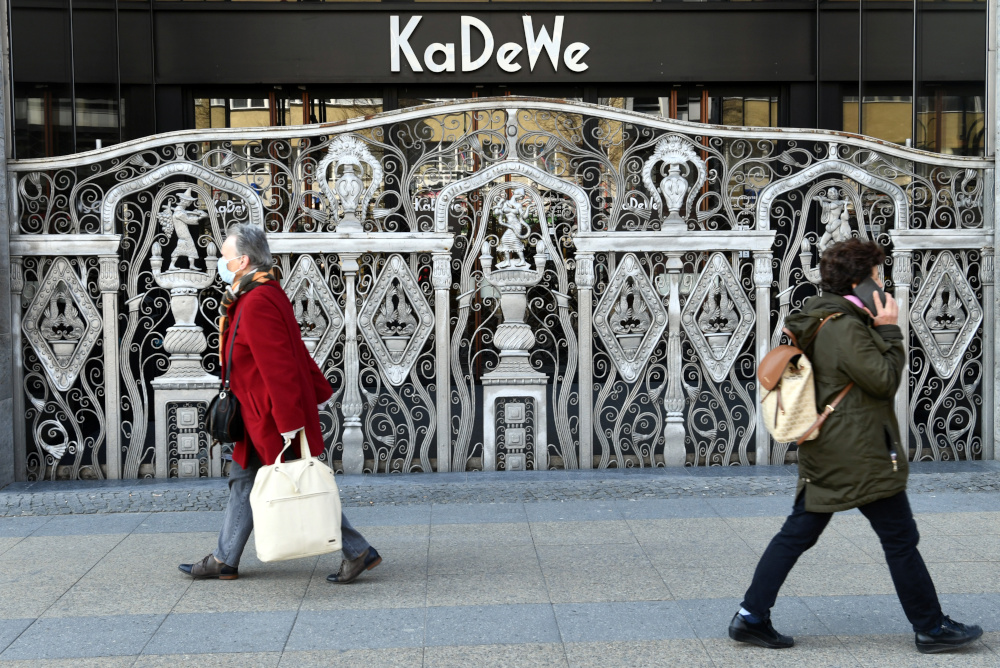BERLIN, Nov 27 — German consumers remain gloomy ahead of the traditionally big-spending Christmas season and a temporary reduction in sales tax worth up to 20 billion euros has failed to get them into shops or online — even when companies have passed it on.
The six-month cut in value-added tax from 19 per cent to 16 per cent was the centrepiece of a €130 billion (RM632 billion) stimulus package launched by Finance Minister Olaf Scholz in June to drag Europe’s biggest economy out of a pandemic-induced slump.
Those measures, including cash handouts for parents and incentives to buy “green” cars, helped fuel growth of 8.5 per cent in July-September, a big rebound from the previous quarter's unprecedented 9.8 per cent plunge.
But households remain focused on savings while many firms have used the VAT relief to shore up their battered margins rather than lowering retail prices, data and interviews show.
“Even if I wanted to spend more on the things that I like such as travelling and going out, I simply can't right now due to the lockdown,” said Berliner Philipp von Bremen, 42, who worked reduced hours in the film industry during the pandemic.
“So I'm definitely spending less than normally.”
Help yourselves
The German subsidiary of US gym equipment manufacturer WaterRower is among companies that did not cut prices, instead adding giveaways such as free cleaning packs to purchasers of its home rowing machines.
“We didn't pass on the VAT reduction through lower prices. That would have been too much administrative effort for six months,” said managing director Dominik Kuprecht.
WaterRower did well during the spring lockdown as gym closures lifted demand. But higher import tariffs put pressure on the balance sheet, which it used the VAT relief to help offset at least partly.
“We got pulled into the transatlantic trade dispute as the European Union decided to put US manufactured trainers onto its list of countermeasures in the aircraft subsidy row,” Kuprecht said.
Tariffs rose from 2.5 per cent to 27.5 per cent, forcing WaterRower to hike prices by up to 20 per cent.
With other companies affected by the pandemic, especially in the hard-pressed services sector, also using the VAT cut to help themselves, Germany's central bank has estimated that nearly 40 per cent of the relief was not passed on to consumers.
And although job protection schemes and other measures have helped stabilise disposable incomes, private consumption remains below pre-crisis levels.
The net household saving rate was 13.5 per cent in July-September, statistics office data shows, below the record 20.1 per cent seen in the second quarter, but still unusually high. The savings rate was 9.2 per cent in the third quarter last year.
“Private households remain cautious with their spending and squirrel away a larger part of their income than normally,” said Claus Michelsen, chief economist at the DIW institute.
Yesterday, the GfK institute said consumer morale deteriorated further heading into December amid new lockdown measures to curb the pandemic's second wave.
Sebastian Dullien, head of the Macroeconomic Policy Institute (IMK), estimates that since the pandemic started consumers have put aside roughly €70 billion more than they did in the same period last year.
“As soon as the crisis is over, this money could flow into consumption and support the recovery in 2021,” Dullien added.
Scholz, who will be the centre-left Social Democrats' candidate to succeed Angela Merkel as chancellor in the 2021 federal election, has resisted calls to extend the VAT cut.
He argues that a return to the regular rate on January 1 will push consumers to splash out this year and pull forward purchases of larger items.
Positive effect
The €790 million incentive scheme for buyers of electric and hybrid cars has been more successful, and Merkel and Scholz agreed this month to extend it until 2025.
Since the stimulus package was announced, registrations of electric and hybrid cars have climbed from month to month, even while Germany's overall car market has been shrinking. In October, they quadrupled from a year before to more than 48,000.
“The VAT cut had a positive effect, of course, but it's not as effective as the increased buyers' premium for e-cars,” said Eckehart Rotter, spokesman of the VDA automobile lobby group.
Asked to give a critical assessment of the stimulus package, Scholz told Reuters the measures were working well and that companies were passing on the tax reduction to consumers.
“Our crisis response has received top marks from the IMF,” Scholz said, adding that the Washington-based lender explicitly praised the elements of Berlin's stimulus package meant to accelerate the shift towards a green economy.
“We are pushing ahead with decarbonisation, including in the transportation sector, because climate change is not taking a coronavirus break,” Scholz added.
He said the extended incentives to buy e-cars and additional funds to expand the network of charging stations would guarantee planning security for companies and secure sustainable jobs.
The abolition from January of an income tax surcharge for most employees, except high-earners — agreed by the government before the crisis — will meanwhile free up roughly €10 billion for additional spending, Scholz said. — Reuters






















